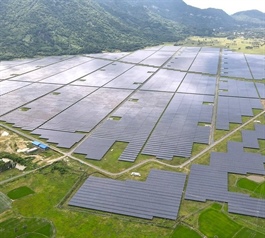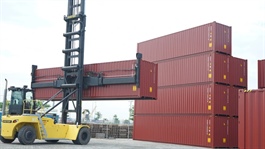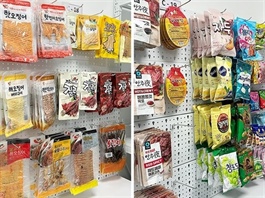Conglomerates aid foreign manufacturing investment
Conglomerates aid foreign manufacturing investment
The manufacturing and processing sector is attracting major investment from abroad, thanks to the expansion of key conglomerates, especially from South Korea.

With total revenues of about $16.2 billion and profit of $400 million last year, Hyosung Group, which works in textiles and garments, industrial materials, IT, construction, and chemicals, has expressed its plan to expand operations in Vietnam.
Hyosung chairman Cho Hyun-joon told Prime Minister Pham Minh Chinh last week that the company wants to invest more in Vietnam in these areas with a large volume of capital.
Hyosung is also planning to build a $300 million data centre in Ho Chi Minh City. According to the plan, the group will build a data centre with a scale of 1,500-4,000 racks meeting international standard to serve hyper-scale partners.
The project is a part of the plans to inject an additional investment of $2 billion into Vietnam in 2024. In addition, Hyosung is looking to invest in a factory manufacturing ATMs in Vietnam, as the company is the world’s third-largest ATM manufacturer.
Currently, Hyosung Core Materials is constructing a $550 million project to produce carbon fibre at Phu My 2 Industrial Park in the southern province of Ba Ria-Vung Tau, which is set to become operational next year. The project was licensed in October 2023.
In March, Hyosung TNC received approval for a project worth $730 million from Ba Ria-Vung Tau People’s Committee to build the largest bio-spandex factory in Vietnam.
Vice chairman Lee Sang Woon said, “Hyosung considers Vietnam a strategic market. The group will not only scale up its operation but wants to turn Vietnam into a sustainable investment destination. We look forward to setting up the company’s future for the next 100 years in Vietnam via expanding operations in southern localities.”
Beginning operations in Vietnam in 2007, Hyosung has invested nearly $5.1 billion here with eight companies and one branch. Its total employee number in the country is about 9,000, with revenues last year hitting $3.5 billion.
The contribution of conglomerates such as Hyosung has contributed to maintaining the growth momentum of foreign direct investment (FDI) capital in terms of the manufacturing and processing sector.
In the first half of 2024, the sector saw the largest amount of FDI at $6.83 billion, accounting for 71.6 per cent of the total disbursed in the country in the period.
The manufacturing and processing activities of foreign-invested enterprises (FIEs) contributed a key part in the total export turnover of the country. The statistics published by the General Statistics Office of Vietnam showed that in the first half of the year, the total export value from FIEs was $123.45 billion, up 13.2 per cent on-year (equalling $14.42 billion), accounting for 72 per cent of the total export turnover of the whole country.
The investment inflows into the manufacturing and processing sector will be consolidated by the commitments from big groups which have been in Vietnam.
During last week’s meeting with PM Chinh in South Korea, Samsung Electronics executive chairman Lee Jae Yong said that Samsung planned to invest “heavily” in Vietnam over the next three years. Samsung Electronics’ CFO Park Hark-kyu in May revealed a plan to invest about $1 billion in Vietnam annually while meeting with PM Chinh.
“Vietnam’s success is Samsung’s success. Samsung Electronics has undertaken a long-term commitment to Vietnam, including the expansion of the local supplier network,” said Yong.
Samsung has already invested $22.4 billion in Vietnam so far and incorporated over 300 Vietnamese companies into its supply chain, a more than 12-fold increase from 2014.
Vietnam now produces half of Samsung smartphones and, last year, total exports of Samsung in Vietnam hit $55.7 billion. The group has expanded local operations from manufacturing plants for smartphones to research and development facilities and, more recently, it has been helping local businesses join its global production and supply chain network.
Samsung is currently the largest FIE in Vietnam, with four plants in Bac Ninh, Thai Nguyen, and Ho Chi Minh City. Mobile phones produced in Vietnam account for over half of Samsung’s global production, with exports expected to increase by more than 10 per cent this year from 2023.
In the framework of the meeting with the Vietnamese PM in South Korea, other conglomerates such as CJ Group, POSCO Holdings, and LG Display also committed to pour additional billions of US dollars into Vietnam as their long-term investment strategies.
In particular, LG Group has invested about $8 billion in the northern port city of Haiphong. Seven projects are valued at over $7 billion, and 50 satellite businesses boast the total investment capital of nearly $1 billion. Over $5 billion has been disbursed so far.
Cheol-Dong Jeong, CEO of LG Display, said that the company’s total revenue in 2023 is estimated to have been $14 billion, and it will invest another $3 billion in Vietnam over the next three years.
Meanwhile, the northeastern province of Quang Ninh on July 3 approved projects run by Foxconn Singapore to deploy in Song Khoai Amata Industrial Park and DEEP C Quang Ninh 2 Industrial Zone.
The smart entertainment product project in Song Khoai Amata will cost $263.7 million and has a design capacity of 4.18 million products per year. Meanwhile, the smart system project at DEEP C Quang Ninh 2 is worth $287 million and will make 8.78 million products annually. According to the investment certificates, the two projects will complete construction by July 2026 and go into official production in May the following year.
In June, Foxconn Singapore also received the go-ahead for a FCPV Foxconn Bac Ninh project worth $383 million. The factory will specialise in manufacturing and assembling circuit boards, with a total capacity of almost 2.8 million items per year.























